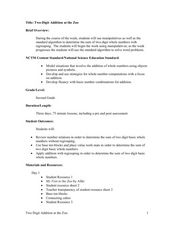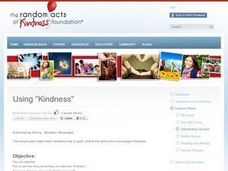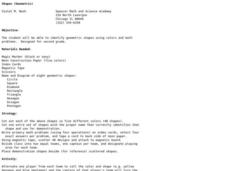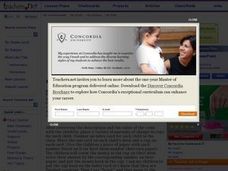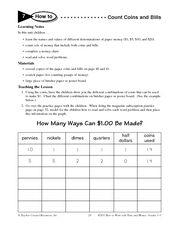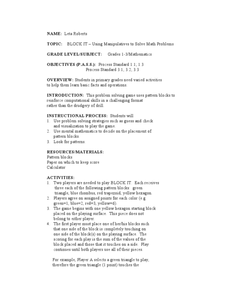Curated OER
Money Booklet
Students practice handling money by examining different world currency. In this economics instructional activity, students utilize a coin booklet to trace individual coins and draw bills, later coloring them in their traditional colors....
Curated OER
Two-Digit Addition at the Zoo
Your second graders explore two digit addition with regrouping. They will investigate problem solving strategies within the context of a trip to the zoo. Multiple resources and assessments are provided.
Curated OER
Seeing Numbers In Tens And Ones
Second graders develop the skill of place values up to the tens place. They practice identifying the values of 2 digit numbers and writing the correlating values with counting. They use the example of money to make the lesson more...
Curated OER
Exploring Teen Numbers
Students explore place value. In this numeration lesson, students use ten frames to represent numbers greater than ten. Students read two digit numerals and build the corresponding number using counters and ten frames. Students...
Pennsylvania Department of Education
Using the Number Line to Compare
Students determine differences using a number line. In this math lesson plan, students use the number line to solve subtraction problems. Students solve puzzles using subtraction.
Curated OER
Who's In The Fact Family?
Students study related addition and subtraction facts. In this math lesson, students use related addition and subtraction to solve problems. Students use manipulatives to explore fact families.
Pennsylvania Department of Education
Adding and Subtracting Three-Digit Numbers by Jumping
Second graders use data to graph information and draw conclusions. In this instructional activity on data analysis, 2nd graders practice gathering, sorting, comparing, and graphing data. Students differentiate data that can and cannot...
Curated OER
Let's Trade
Second graders engage in a instructional activity which focuses on adding two-digit numbers and the regrouping process. They identify when the regrouping process is necessary and make appropriate "trades" to complete an addition problem.
Education World
High, Low, or In Between?
Trios play a card game that reinforces the concepts of number sequence and greater than and less than. Scholars make predictions based on information they know and a single unknown. They see cards drawn by others in the group, but not...
Curated OER
Telling Time
Young learners participate in activities which help them understand analog clocks, and the vocabulary of telling time. They examine the values of the intervals of minutes and hours by making a human clock.
Curated OER
Using "Kindness"
Students discover the benefits of kind acts by dissecting the word itself. In this vocabulary lesson, students utilize the letters in the word "kindness" to create other words which they record. Students figure out what "kindness"...
Curated OER
Delayed Gratification
Word problems are great for engaging critical thinking skills, and word problems involving money increase a child's financial literacy. Boost your critical and financial thinkers with a multi-step word problem involving money and problem...
Curated OER
Introducing money (Elementary, Mathematics)
Students study the penny, nickel, dime and quarter, one each day for four days, using a magnifying glass to identify the similarities. Then students discuss differences and value and learn a 'rap' to memorize values.
Curated OER
Shapes (Geometric)
Second graders explore various geometric shapes. In this math lesson plan, 2nd graders identify geometric shapes using colors and math problems.
Curated OER
Hula Hoop Hullabaloo
Second graders use hula hoops to represent the zero as they count objects into ones, tens, hundreds and thousands. They complete an activity to after they have practiced counting objects.
Curated OER
Scoot for Money
Students rotate through a group of centers counting the coins that are in a cup placed at each spot. After completing the entire circuit, papers are graded as a whole class and each student gets to spend the money in their cup at a class...
Curated OER
How To: Count Coins and Bills
Students discover the names and values of different monetary denominations. For this money lesson, students examine the different combinations that money can be added in to find specified amounts. The students complete worksheets based...
Curated OER
Coin Carnival
Learners investigate the value of coins. In this coin value lesson, students read The Penny Pot by Stuart Murphy. Learners expand on skills learned in the book and engage in activities to determine the value of a mixed set of coins while...
Pennsylvania Department of Education
Freckle Face
Students collect and record data. In this early data analysis lesson, students gather data about their partners face. As a class, the students use tally marks and pictographs to record the data and answer question about the information...
Curated OER
Battle of "The Cents"
Learners explore money. In this counting money lesson, students play a card game using the rules of "War." Learners turn over cards, determine the money value represented, and the student with the highest value keeps the cards.
Curated OER
Block It: Using a Manipulative to Solve Math Problems
Students practice using visuals to solve math problems. In this math manipulative lesson, students utilize pattern blocks to participate in a class game in which geometric shapes touch other player's pieces. Students gain points based on...
Curated OER
Three-Digit Addition and Subtraction With Regrouping
Second graders access prior knowledge of addition and subtraction using two-digit numbers and calculate easily with them. In this three-digit addition lesson, 2nd graders learn to add and subtract three-digit numbers with and without...
Curated OER
How to Round Numbers
Students exercise rounding numbers to the nearest tens, hundreds, and thousands. In this rounding numbers lesson, students participate in a rounding numbers activity, covering the concept of rounding in both addition and subtraction.
Curated OER
Ten Little Black Dots
Second graders use black and red construction paper to symbolize different one digit numbers that add up to 10. In this sums to 10 lesson plan, 2nd graders discover different combinations and patterns that can lead them to the number 10.



